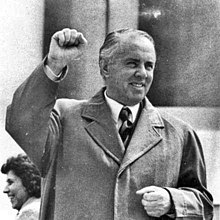Enver Hoxa
| Enver Hoxha | |
|---|---|
 |
|
| First Secretary of the Party of Labour of Albania | |
|
In office 8 November 1941 – 11 April 1985 |
|
| Preceded by | Position created |
| Succeeded by | Ramiz Alia |
| 22nd Prime Minister of Albania | |
|
In office 24 October 1944 – 18 July 1954 |
|
| Preceded by | Ibrahim Biçakçiu |
| Succeeded by | Mehmet Shehu |
| Personal details | |
| Born |
16 October 1908 Ergiri (Gjirokastër), Janina Vilayet, Ottoman Empire |
| Died | 11 April 1985 (aged 76) Tirana, Albania |
| Cause of death | Cardiac arrhythmia |
| Nationality | Albanian |
| Political party | PPSH |
| Spouse(s) | Nexhmije Xhuglini |
| Children |
Ilir Sokol Pranvera |
Enver Halil Hoxha (Albanian pronunciation: [ɛnˈvɛɾ ˈhɔdʒa]; 16 October 1908 – 11 April 1985) was an Albanian communist politician who served as the head of state of Albania from 1944 until his death in 1985, as the First Secretary of the Party of Labour of Albania. He was chairman of the Democratic Front of Albania and commander-in-chief of the armed forces from 1944 until his death. He served as the 22nd Prime Minister of Albania from 1944 to 1954 and at various times served as foreign minister and defence minister as well.
During his 40-year-rule, Hoxha's regime committed a series of political repressions which included the establishment and use of forced labor camps, wrongful incarcerations, extrajudicial killings and executions that targeted and eliminated anti-communists and other dissidents, and evictions of families from their homes to remote villages strictly controlled by his secret police, the Sigurimi, which, like Nicolae Ceaușescu's Securitate, was strongly oppressive and ubiquitous. His rule was also characterized by the use of Stalinist methods to destroy associates who threatened his power. He focused on rebuilding the country, which was left in ruins after World War II, building Albania's first railway line, eliminating adult illiteracy and leading Albania towards becoming agriculturally self-sufficient.
...
Wikipedia
